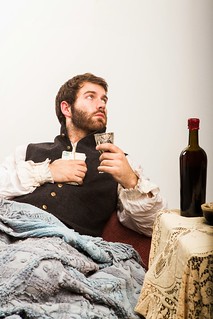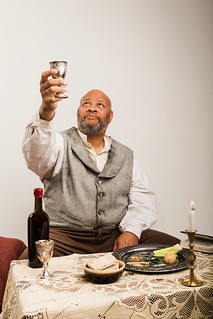Over two years ago, I blogged in this space about “A Secular Passover” and discussed, among other issues, American Jews of the confederate south around the time of the civil war.



Caleb (Andy Prescott), John (Luther Simon) and Simon (Carl Brooks) in the Omaha Community Playhouse Production of “The Whipping Man”
I addressed the bitter irony of these Jews celebrating Passover–freedom from Egyptian slavery (as the tale is told)–while being served by African American slaves. Little did I realize that a remarkable play written by Matthew Lopez called “The Whipping Man” addresses the very same issue.
On Fri. eve, I had the opportunity to attend the Omaha Community Playhouse’s rendition of “The Whipping Man,” starring three extremely talented local actors, Carl Brooks, Andy Prescott and Luther Simon, and directed by Stephen Nachamie. The Omaha Community Playhouse (OCP), which was the debut stage of Henry Fonda, Marlon Brando and a number of other famous actors, is a delightful place. With large and small theatres, the OCP has tremendous appeal. We sat in the front row of a small ~100 person theatre, essentially on stage with the actors. I was even concerned that I might trip one of them if I were to stretch my legs too far.
The OCP features “amateur” performers who are 100% professional except for the fact that they volunteer their time. Most carry full time jobs with rehearsals and performances in parallel, and their acting is truly first rate. Combined with professional directing and a wonderful atmosphere, the OCP is an Omaha treasure.
“The Whipping Man” is not an easy play to watch. Set in the immediate aftermath of the American Civil War, Jewish confederate Captain Caleb DeLeon returns to his ravaged childhood home in Richmond, Virginia severely wounded on Passover eve, just prior to Lincoln’s assassination. He finds Simon, the faithful and caring family slave left alone in the devastated house, and soon the two are joined by John, a younger family slave who grew up together with Caleb.
Simon, who throughout the play praises the Jewish family for its more humane treatment of slaves, is derided by John, who was sent numerous times to “The Whipping Man” to be beaten for his behavior. Caleb defends his family’s position, supporting Simon’s contention that John should consider himself ‘lucky’ to be a slave in a Jewish family rather than on a Christian plantation owner’s property. But as John notes, “That’s still not good enough.”
Despite the scarcity of food and the uncertainty of the situation, Simon decides that the three of them need to celebrate Passover–in part to celebrate the freedom of the African American slaves–with a traditional Passover ‘Seder’ and meal.
As the evening unfolds, secrets are revealed, and the true horror of slavery is revealed, by a shockingly clever plot and some brilliant acting. I will not be a spoiler, as I highly recommend seeing this play.
